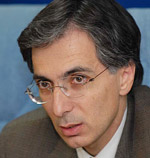During his yesterday’s meeting with journalists the RA Minister of Finances Tigran Davtyan has made a very cautious but optimistic statement. But he didn’t speak about the abrupt progress of the economy (as did Nerses Yeritsyan) but instead informed that certain motives of stabilization are noticeable.
“According to our expectations there will a slight stabilization of the economy in the second half or closer to the end of the year. Next year we are forecasting a 1.5% economic growth,” stated Davtyan. When speaking of the economic developments the minister of finances resembled the Armenian economy to an airplane, which with low fuel got trapped in turbulence (crisis). The autopilot doesn’t work and the personnel, the government in this case, is trying to land the plane with bad engines by trying to make sure that the passengers suffer the least. In the opinion of Davtyan it seems that the personnel succeed in it. “During 8 months our economic growth of 13% lowered to 16%. There was a slump of 30%. Other countries wouldn’t survive if they faced a 30% economic decline within eight months. Under the given conditions each country suffers a collapse: the crisis is felt throughout the country. In such cases countries feel a great depression; they give soup to people in the streets on a barrel. Today when I walk in the capital streets people come up to me and say: The crisis seems to have passed. On the whole, people no longer feel the crisis," mentioned the minister. Thus our plane is still going. “There were no cases of delaying salary payments. We fulfill the expenses of the state budget by 100%. We don’t have any systematic issues of paying salaries, pensions or other expenses. We have all the necessary resources,” says the minister and adds, “As a whole people don’t feel the impact of the crisis.” Moreover when walking on the street on Sundays the minister meets people and they ask him, “So, what’s up with the crisis? Is it over yet?” In the words of Davtyan positive motives are also perceptible in the tax-collection sector. The taxes levied in June exceeded the taxes of May and as of the current data the taxes of July will exceed the taxes of June by 15%. “The financial means from international organizations will suffice for execution of budget 2009,” Davtyan noted. According to him, Armenia will receive an additional USD 1 billion from the International Monetary Fund, the Asian Development Bank and the Russian Federation. Minister of Finance stated that the government has clearly estimated how it will maintain the state debt, noting that the correlation of the external debt to Armenia’s GDP in the nearest 10-11 years will be at the level of 37-38%, which is lower than the allowed maximum level of 50%. “Significant part of the attracted loan resources will be used to credit economy, thus, the private sector will also represent a source to maintain the given loans”, Davtyan stated. Upon conclusion of the first six months, 2009, certain tendencies are apparent in the Armenian economy, Tigran Davtyan stated. He doesn’t agree with the opinion that the anti-crisis steps of the government are too slow. There were also questions about the risks of the taken loans. "It is not considered to be risky. Of course, the foreign debt will grow, but we have a rather low level of resources with 13-14% in the beginning of this year. This is the government’s debt, including the debt of the Central Bank and within 1-2 years we will have a maximum 38% debt with the GDP relativity." According to Davtyan, some of the resources will be left for the 2010 state budget, especially nearly half of the loan from the IMF. A part of the loan from Russia is also foreseen for next year and nearly 24 billion drams will be used for closing this year’s deficit. In order to evaluate the velocity of the actions of the government he made a comparison, “we were able to get 1 billion USD during only 6 months in the cse when during 20 years we were able to attain only 1.5 billion USD in total.” Thus it turns out that we are really good at finding money. “Whether is this enough or do we need additional resources?” To out question Davtyan responded, “I think that the resources that we have attained are enough to overcome the upcoming 1-2 years. We are also negotiating with the EU. In general we can be psychologically calm about overcoming the economic difficulties in an economic regime. There is no need for additional resources at this moment.” In this regard there is certain contradiction within the government. According to Davtyan there is no need for additional financial resources but Prime Minister Tigran Sargsyan on the other hand during the last government session spoke about the necessity of taking a loan in the framework of the Eurazes. Let us recall that the Prime Minister with regret mentioned that there are funds and we just don’t have proper projects to ask for those funds. He assigned the members of the government to “reveal projects” so that we’d be able to benefit from this “exclusive opportunity” and the sooner the better. We asked the minister of finances what the amount of the money is going to be and what the conditions are. Davtyan didn’t bring up details by mentioning that the Eurazes fund was recently formed and the funds are being still accumulated and it may start to work only by the end of the year. But as he mentioned it is necessary to have projects prepared. “Projects are not prepared overnight. They require serious surveys,” Davtyan said. Let us mention that the Eurazes fund anticipates 10 billion USD worth funds, the majority part of which is the investment of Russia – 7.5 billion USD. The investment of Armenia is only 1 million USD.

